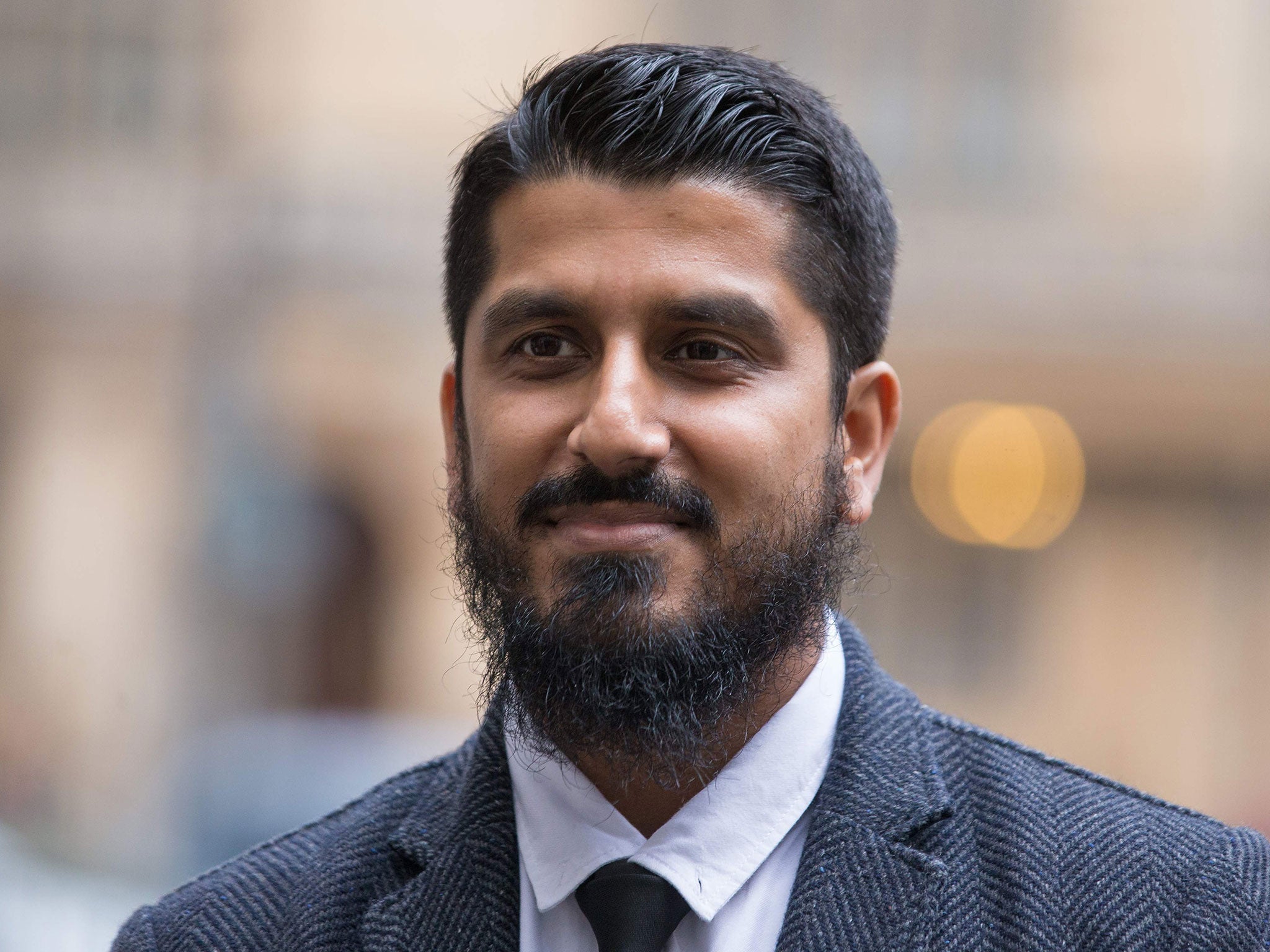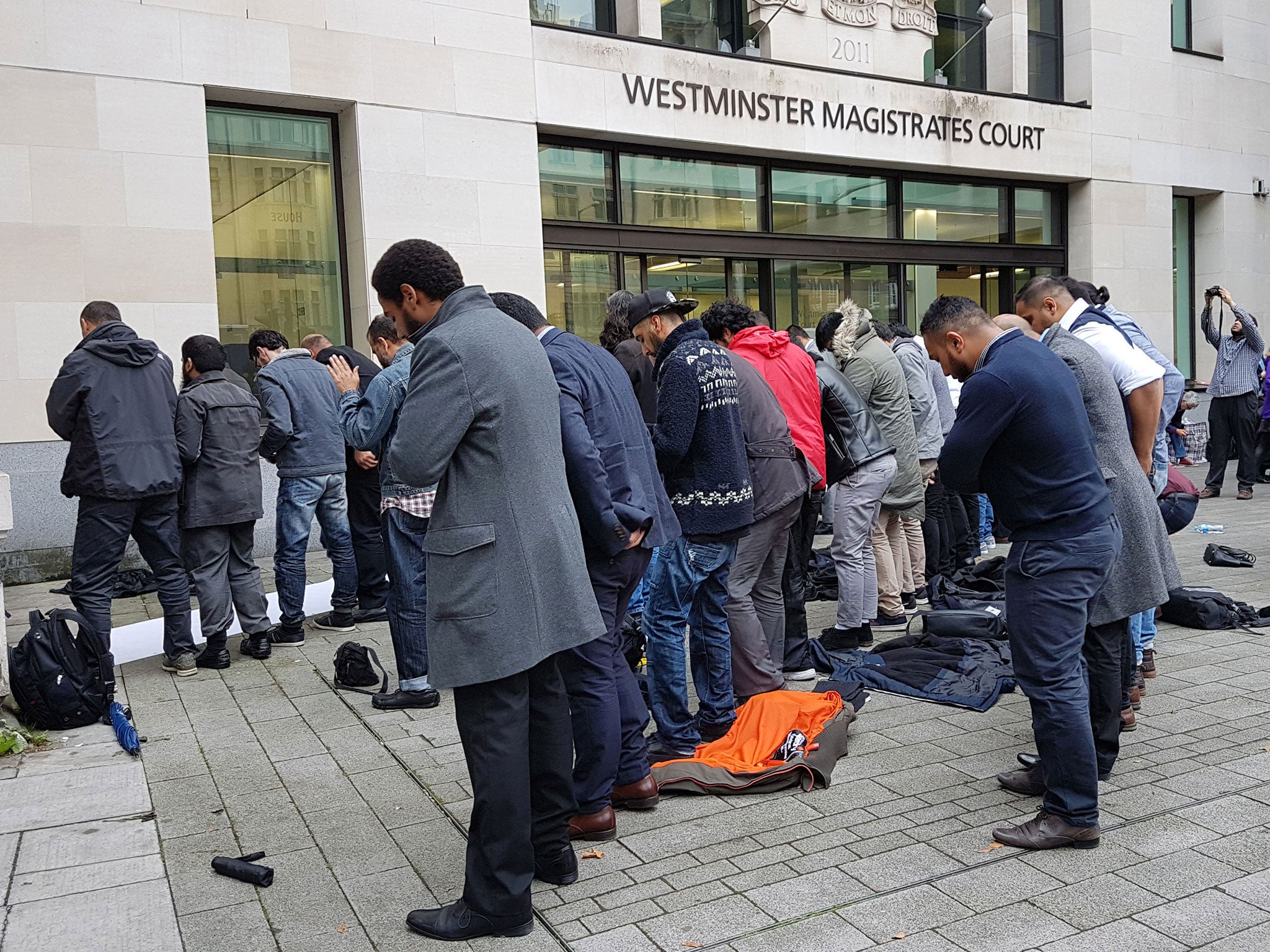Man convicted of terror offence for refusing to give police phone and laptop password
Cage director Muhammad Rabbani vows to appeal decision under 'absurd' terror powers

The director of an advocacy group has been convicted of a terror offence after refusing to give police passwords to access his phone and laptop at Heathrow Airport.
Muhammad Rabbani vowed to appeal the first verdict of its kind after being handed a 12 month conditional discharge and ordered to pay £620 in costs at Westminster Magistrates' Court.
The director of Cage was stopped under the Terrorism Act on 20 November last year after returning home from a wedding in Doha, Qatar.
Officers demanded access to his phone and laptop under wide-ranging powers granted by Schedule 7 of the law.
It allows police and immigration officials to stop, search, question and detain anyone at British ports and airports to determine whether they were involved in the “commission, preparation or instigation of acts of terrorism” – with or without reasonable suspicion.
In the year to June 2017, 17,501 people were stopped under the power but only 1,522 of those were detained, according to Home Office statistics.
Rabbani refused to hand over his Pin or password, saying he had been stopped many times under the schedule before and had never been required to give these details.
The 36-year-old told the court the devices contained confidential information on an alleged victim of torture by American agencies, and that sharing it would breach “personal and professional” privacy.
The court heard that Rabbani refused to tell officers what he did for a living, telling them “it won't help you in any way” and citing his right to privacy.
PC Tariq Chaudhry, who conducted the search, said: “I asked him questions about his occupation and he said he was a director of a company but wouldn't go any further - he kept saying 'You don't need to and it won't help you in any way'.”
Rabbani was warned that he would be arrested if he failed to give access to the devices, but said he had never been asked to give the information during “numerous” previous stop-and-searches.
He was arrested at Heathrow Airport and later charged under an offence that makes it illegal to “wilfully obstruct, or seek to frustrate, a search or examination” under Schedule 7.
In a prepared statement given at his second police interview in May, Rabbani said: “I considered that although the police were in law entitled to ask questions so that they could satisfy themselves I was not engaged in terrorist activity, that did not justify my in addition being required to expose all the sensitive contents of my phone to being copied and undoubtedly disseminated not just to police but to intelligence services and possibly elsewhere in the world - an unjustifiable, uncontrolled acquisition of material.”
He told the court he was carrying a large volume of documents relating to a Qatari torture victim.
“It was a case involving the US against an individual who was allegedly tortured over the course of 12 or 13 years in US custody,” he added.
“There were around 30,000 (documents) which I was especially uncomfortable handling and I felt an enormous responsibility to try and discharge the trust that was given to me.”
Senior District Judge Emma Arbuthnot said: “I find he took a calculated risk and, as on certain earlier occasions, the police wouldn't take any further action.
"He took a calculated risk. At the time of the stop he was warned over and over he would be committing an offence if he didn't provide the information."
Speaking to supporters and media gathered outside the court, Rabbani said the judgment exposed the “absurdity of the Schedule 7 law” and called for it to be reformed.
"I was prepared from the outset to pay the ultimate price, even if that meant imprisonment,” he added.
“At no point was I under suspicion and this was a matter of being profiled at the airport. There are important implications for our collective privacy as Schedule 7 acts as a digital strip search.
"I took the decision not to raise the details of an important torture case before my arrest and ultimately I have been convicted of protecting the confidentiality of my client.
“If privacy and confidentiality are crimes, then the law stands condemned.”
The Metropolitan Police said Rabbani’s position did not “give him the privilege of not sharing information with police”.

Journalists and lawyers are granted special protections over the information they carry and their devices cannot be removed by police without a court order, but members of non-governmental organisations are not afforded any exceptions.
An order that allowed police to seize the laptop of a BBC Newsnight journalist who had been communicating with British Isis supporters was controversially granted in 2015.
Commander Dean Haydon, head of the force’s Counter Terrorism Command, hailed the “important” verdict, adding: “It’s crucial that police are able to use the legislation that exists to help keep the public safe.
“Schedule 7 of the Terrorism Act 2000 is a vital tool in the fight against terrorism and we are committed to ensuring the power is used appropriately and proportionately, as it was in this case.
“The Met has retained Rabbani’s phone and laptop and is continuing its efforts to examine the contents.”
Cage said Rabbani would be appealing the conviction as part of efforts to defend the right to privacy.
“To convict under terrorism law despite not having anything to do with it is a perfect example how scaremongering is used to erode our rights,” a spokesperson added.
“It's precisely for this reason that Cage will continue to call for the abolition of all counter-terrorism legislation.”
Cage describes itself as an “independent advocacy organisation working to empower communities impacted by the War on Terror” but has faced controversy over its work with clients including Mohammed Emwazi.
He sought advice from Cage over alleged harassment by the British authorities before leaving for Syria in 2012, where he became the Isis executioner known as Jihadi John.
Asim Qureshi, the research director at Cage, described Emwazi as a “beautiful young man” before the identity of the executioner was confirmed.
Additional reporting by PA
